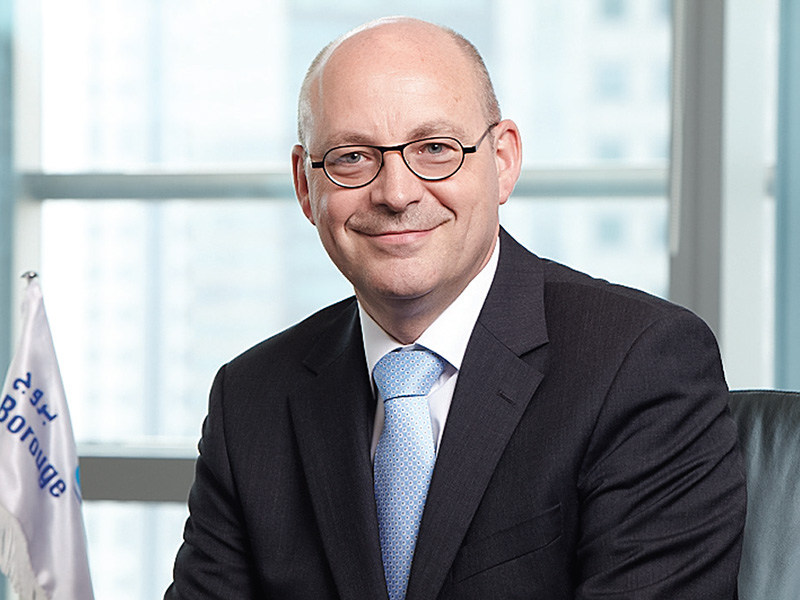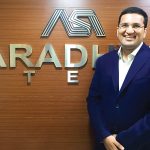
“We are in the industry because we believe this is an industry with a long term future. We are a private owned company owned by ADNOC, an Abu Dhabi National oil company, and Borealis which is an Austrian polyolefin company having long term commitments. We are not leaving any corners; we are willing to invest to drive real growth; the growth must be sustainable and contributing to the society. That is our commitment as a company to our customers. We are into making our customers successful by developing the right products as long term competitive solutions for the industry of wire and cable,” said Mr. Wim Roels, CEO, Borouge Pte. Ltd., during a sweeping tête-à-tête with team Wire & Cable India.
The detailed conversation covered the company’s fundamentals driving its robustly growing production capacity, the idea behind the expansion of commercial and logistics network in the Middle East and Asia, and the company’s resolute stand behind sustainability of industrial practices. Below are the excerpts:
Wire & Cable India: Can you summarize the rationale behind the story of five decades of plastic solutions that Borouge provided to the world?
Wim Roels: Rationale, of course, is a big word. However, as a company it’s not only for Borouge, but also valid for one of our parents i.e. Borealis. The fundamental belief of our company is that innovation has to be the corner-stone for the existence and further growth of the company. The world and societies are changing leading to a noticeable change in the expectations and demand. What people expected back five decades is substantially different than their present expectations. As a company with sustained success, we need to evolve with society and that warrants innovation.
Our company is driven by the basic requirements of the world. We innovate to counter challenges related to the basic requirements viz. water supply, energy, food, and health care. Of course, these challenges might vary degree wise in various part of the world, but they are fundamentally the same. This maxim has been our driver for innovation, both in Borealis and Borouge for the past fifty years, and that will be the basic driver for the company in the years to come. What innovation we would focus and how we will realize it may vary with time, but the basic driver would be the same.
WCI: A plant was placed in 2014 as a major capacity addition. Kindly shed some light on the capacity additions.
WR: We are in the process of starting the third phase of expansion called Borouge 3. This expansion project is set to increase the total annual manufacturing capacity of the Abu Dhabi plant to 4.5 million tonnes per year to create the world’s largest integrated polyolefins plant. The first production started in 2001 with 450,000 tonnes which was expanded to 700,000 tonnes. In 2010 we added 1.5 million tonnes capacity, now with Borouge 3 we are adding 2.5 million tonnes capacity more. Borouge 3 envisages 1.5 million tonnes per year ethane cracker and five polyethylene plants i.e. 2 PP lines, 2 low pressure polyethylene lines, and one high pressure polyethylene line which is dedicated to wire and cable industry. These plants are being started up and the cracker is running. The first PE line is also running and the other plants are starting up at the moment which will be streamlined in the future.
Next year, we will gradually ramp up production rates and move up to full production capacity. Of course, this is a big expansion but we believe that the growth in Middle East and Asia is still significant and requires further expansion of production capacity. We at the same time want to enter into the field of wire and cable. Traditionally, we have been sourcing the wire and cable materials from Europe, but now is the time to produce these kinds of sophisticated products in the Borouge plants in the Middle East. By doing so, we will be better in meeting customer requirements with much speed and exact specifications by the Asian customers.
WCI: From a customer’s viewpoint, what kind of value will the expansion add to the wire and cable sector in general and customers of Borouge in particular?
WR: Well, because we are adding significant amount of capacity, it will give us more volume to offer to our customers. We are much closer to our customers with this expansion, so we will have more efficient and faster delivery times. Moreover, we are tuning the products to fit into Indian customer requirements. We are installing substantial capacity to produce value creating, innovative wire and cable solutions. Now, we are customizing more to Asian demands, Asian requirements which are not always the same as the Europeans. We can do that with our new assets, which shows commitment from both Borealis and Borouge to wire and cable industry. We have invested, in the last five years, over a billion dollar into the wire and cable industry by the new plants in Europe and here in Ruwais (240 km west of Abu Dhabi) dedicated to the wire and cable industry.
WCI: What potentials do you foresee for Borouge in the wire and cable industry?
WR: The need for power is one of the basic requirements of the society. We, therefore, believe there’s continued potential for further growth into the wire and cable business. See the ever growing urbanization in the Asian countries like China, India, Indonesia, and Vietnam which requires power systems. It’s not only the power; we should not forget the data transport.
Wire and cable industry sees a whole gamut of opportunities into this rapid Asian urban expansion which, in turn, creates great opportunity for us too.
With urbanization, specialization is also taking place. We are developing new systems like high-voltage power-supply with DC cables which is very much linked to long distance power transportation which, in turn, is linked to alternative power supply. Solar systems and wind mills are found far away from the cities and you need to transport this power over long distance where DC power cable have been quite effective incurring less loses, being more cost efficient and environmentally sustainable.
We believe that there’s quite a significant growth potential in Asia for wire and cable industry in coming years, both on the power supply and data front. Even in India, this project is going on which is supplying data, to every home, which is a massive project driving a fantastic opportunity for the cable industry both for customers and us. I believe this kind of projects will also come in other countries like Indonesia, Vietnam, China and Africa.
WCI: What practices does Borouge follow to ensure sustainability in operations?
WR: Well, sustainability is a very important trend which means that you really reflect on what you do. You calibrate your actions in the light of what does it mean for the planet, for the place we live in, for the society as a whole, and what kind of profit you aim for the company. In the end, we need to ponder over all these things taken together for long term success in the business.
Borealis and Borouge have been working with the said agenda in the past and will continue in the future. We contribute to environmental sustain-ability in many ways; it starts with our operations, where we have extensive projects to reduce the use of cooling water and optimize its use. We also focus on reducing flaring to reduce emissions, on reducing energy consumption and on other processes to make our operations more energy efficient.
It doesn’t stop here, but goes all the way to how we deliver it to our customers. We spend sizeable amount of money for ensuring energy efficiency in our logistics system and shipping efforts. Though it may sound strange, we put a lot of emphasis on reducing the consumption of plastics. For example, a cap; one of our important research projects was how to make the cap shorter and lighter. Because, of course, customers like it; it costs less; it’s less material consumption; and it produces less waste. It saves resources that may be incorporated in many of our operations.
When we talk about wire and cable industry we have this DC power; it substantially reduces power loss and therefore energy delivery costs over lost distance transmission. But, if you calculate it on a city scale, it can be a lot of power. The same goes for the pipe in water supply. In a city like London, drinking water supply incurs a loss of 40 percent. All the water they produce leaks out of the system back into the ground, and this is London! At the same time, if you look to Singapore, it’s just 3 percent by having high quality water supply systems. You can reduce these significant losses in water supply systems with the polyethylene pipe system and steel pipe coated systems to avoid corrosions and to make it flexible with the movement of the earth. That’s how you contribute to more sustainable society.
We extend this experience over all our industry practices. We also have an automotive business, where key driver is reducing weight of the car so that they consume less fuel, and have lower emissions. This way, not only you save resources, but reduce the emissions into the environment too. To derive more sustainable solutions, producing better performing products is necessary by reducing the weight. At the end, such practices contribute to more cost effective operations to our customers, and that’s what sustain-ability is about.
WCI: Affordable solutions are the need of every customer. How does Borouge bear this affordability in mind while doing R&D for the solutions meant for the emerging markets?
WR: Affordability is very important. But, I would like to explain affordability a bit further. Too often, people and customers construe it as cheap and cheap is not affordable; affordable means you have solution that is sustainable at a lowest possible cost. In the case of wire and cable, you should look at the lifetime of a cable. You can have a very cheap cable lasting for five years, or you can have a cable which can cost 10 percent more but going to last for fifty years. What is the affordable solution? We want to promote endurance in our solutions as a company and we put in a lot of efforts, with the value change in our cable, pipe, and automotive industry, to look at the life cycle of the product and to offer the most cost efficient solution.
If you only focus on cheap, it’s a very dangerous trend which will destroy the image of the industry especially when such products fail within few years of their life span. The industry must look forward to offering lowest cost, long term solutions.
WCI: How do you ensure the company stays focused in the high growth opportunity? Explain the significance of Borouge’s increased exposure to the emerging markets.
WR: Growth is very important, and as Borouge we have grown by about 700 percent in the last five years. We are growing extremely fast which calls for urgent consolidation after Borouge 3 to stabilize and secure the fundamentals the company is build upon. To stabilize and secure it is important that whatever we do, we do with right quality, with right education, and with right focus.

We, as a company, will continue growing with our commitment to Asia and India. We have created our value in the segments like cable, pipe, automotive, and packaging products. Together Borealis and Borouge have spent around USD 1 Billion in the wire and cable industry in the last five years which is a lot of commitment. With the constant support from our owners, we are committed to remain as the leading player of the polyethylene industry in the years to come.
In that respect, I believe that wind of opportunity has arrived in India which must be grabbed by the industry and the government to build that platform with an export capability for a wide range of products. For building this capability, the supply of infrastructure resources is one important factor and that’s where Borouge, as the wire and cable industry, can play a major role as the supplier to our customers in India. As the producers, we can play a major role in supporting the long term growth in the industry, in the Indian economy.
WCI: What kind of approach you take to educate your customer’s?
WR: Well, one of the things we have done in India is to engage with decision-makers for various sectors to get the data of usages. For example, in the power sector, we have presence in various states and we have also consulted with the center. We have tried educating people about how does it improves on by cutting down losses or on processing speed etc. It takes a bit of time, but I would say in the last five years, we have done a lot of work in these areas in terms of educating people, and slowly that translates into actual operation from the ground level.
For example, the OFC cable in the BBNL project, we actually went to found out the key area they were focusing on. We got the product and got it tested through the central laboratories, to prove to them that here you don’t need to add additives which are harmful to people who handle this cables while laying down and once it’s laid down to the people who are in the vicinity of the cable. Today, our product is one of the first products which fulfill this project. It does take time but that’s where we bring our commitment to educating people.
WCI: As regards India, what kind of opportunities and challenges do you see in the country in the next five years or the couple of decades, especially in the Indian wire and cable industry?
WR: India is an emerging economy; it’s a country with a lot of potential and a lot of growth opportunities. And as I mentioned earlier, the urbanization is going to drive the requirements and the needs for cable and power in India. One of the statements that I made at a film conference in autumn last year here in Mumbai was that if you look to the world, China had been the factory of the world over the past ten years driven by low cost labor. China East Coast is getting more expensive, the time of low cost labor is over.
I think India has opportunity to share the production platform now. Because India has the skilled labor, and well educated people, the fundamental ingredients to become an important production platform for the global economy. But to make that happen, infrastructure is essential. Power and data transportation systems are key infrastructure elements to develop such a platform.




